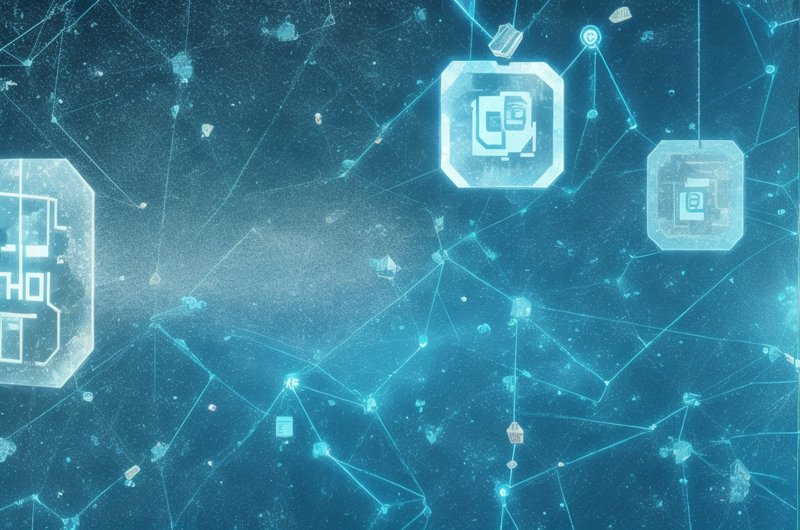Why Blockchain Is Disrupting the Gaming NFT Market

This article examines the disruptive impact of blockchain technology on the gaming NFT market. It explores the rise of blockchain in the gaming industry and how it provides transparency in the realm of gaming NFTs.
The article also delves into the effect of blockchain on ownership and authenticity, highlighting the potential for decentralized gaming.
Furthermore, it investigates the role of smart contracts in enhancing security and trust in gaming NFTs.
Overall, this article aims to shed light on the changing landscape of gaming NFTs due to blockchain innovation.
Key Takeaways
- Increasing number of blockchain gaming partnerships
- Secure and transparent platform for creation and ownership of digital assets
- Assurance of ownership and authenticity
- Revolutionizing game development, play, and monetization
The Rise of Blockchain in the Gaming NFT Market
The incorporation of blockchain technology has witnessed a significant rise in its application within the gaming NFT market. This can be attributed to the increasing number of blockchain gaming partnerships and the overall growth of the blockchain gaming market.
Blockchain technology offers several advantages that make it attractive to the gaming industry. Firstly, it provides a secure and transparent platform for the creation and ownership of digital assets, such as in-game items and characters. This eliminates the risk of fraud or theft, as ownership can be easily verified through the blockchain.
Additionally, blockchain technology enables players to trade and sell their digital assets in a decentralized manner, without the need for intermediaries. This fosters a more open and accessible gaming economy, with increased player autonomy and control over their virtual possessions.
As a result, the integration of blockchain technology in the gaming NFT market has gained significant momentum, with industry players recognizing the potential for innovation and disruption in this space.
How Blockchain Technology Provides Transparency in Gaming NFTs
Transparency is a key feature enabled by the application of blockchain technology in the context of gaming non-fungible tokens (NFTs). The integration of blockchain into gaming NFTs offers several advantages in terms of transparency.
Firstly, blockchain provides a decentralized and immutable ledger, ensuring that all transactions and ownership transfers are recorded and cannot be altered or tampered with. This transparency allows players and collectors to verify the authenticity and provenance of NFTs, reducing the risk of fraud and counterfeit items.
Additionally, blockchain technology enables real-time visibility into the supply and demand of NFTs, allowing for fair and transparent pricing mechanisms.
Furthermore, the use of smart contracts on the blockchain ensures that all terms and conditions of NFT transactions are automatically executed, eliminating the need for intermediaries and enhancing transparency in the overall process.
The Impact of Blockchain on Ownership and Authenticity in Gaming NFTs
One notable effect of integrating blockchain technology into the context of gaming NFTs is the increased assurance of ownership and authenticity. This is particularly significant in addressing ownership challenges and preventing counterfeits in the gaming industry. Traditional gaming assets often suffer from issues related to ownership, as players cannot easily prove their ownership or transfer assets outside of the game environment. However, blockchain technology provides a decentralized and transparent platform that enables players to securely own and trade gaming assets. By recording ownership information on the blockchain, players have a verifiable and immutable proof of ownership. Additionally, blockchain’s cryptographic algorithms make it extremely difficult for counterfeit assets to be created or replicated. This ensures that each gaming NFT is unique and authentic, protecting both players and developers from fraudulent activities.
| Ownership Challenges | Counterfeit Prevention |
|---|---|
| Difficulty proving ownership or transferring assets | Immutable proof of ownership |
| Lack of transparency in ownership records | Unique and authentic gaming NFTs |
| Risk of counterfeit assets | Protection against fraudulent activities |
Decentralized Gaming: How Blockchain Is Revolutionizing the Industry
Decentralized systems have brought about transformative changes in the gaming industry, revolutionizing the way games are played, owned, and traded. One of the key aspects of this revolution is the emergence of decentralized marketplaces enabled by blockchain technology.
These marketplaces allow for the seamless exchange of in-game assets, such as non-fungible tokens (NFTs), between players, without the need for intermediaries. The adoption of blockchain in the gaming industry has facilitated secure and transparent transactions, ensuring the authenticity and ownership of these digital assets.
Moreover, decentralized marketplaces provide players with a greater level of control over their virtual possessions, empowering them to monetize their skills and efforts in the gaming world. This shift towards decentralized gaming has opened up new opportunities for players, developers, and investors, creating a more inclusive and efficient ecosystem for the gaming industry.
Exploring the Potential of Blockchain-Enabled In-Game Economies
This discussion aims to explore the benefits of utilizing blockchain technology in the context of in-game economies. By incorporating blockchain into virtual asset management systems, various advantages can be realized, such as enhanced security, transparency, and ownership verification.
Furthermore, the impact of blockchain on virtual assets can significantly transform the gaming industry, allowing players to truly own and trade their in-game items, while also enabling developers to create more immersive and dynamic gaming experiences.
Looking towards the future, the integration of blockchain in gaming economies holds the potential to revolutionize the way games are developed, played, and monetized, paving the way for new business models and opportunities.
Benefits of Blockchain
Blockchain technology offers several advantages in the context of the gaming NFT market. The following benefits of blockchain can be observed:
- Immutability: The decentralized nature of blockchain ensures that once data is recorded, it cannot be altered or tampered with, providing increased security and transparency to the gaming NFT market.
- Ownership and Authenticity: Blockchain enables the creation of unique digital assets, known as NFTs, which can be easily verified and proven to be authentic. This allows gamers to truly own their in-game assets and trade them securely.
- Interoperability: Blockchain technology allows for seamless integration across different gaming platforms and ecosystems. This enables gamers to use their NFTs across various games, enhancing the overall gaming experience.
However, the integration of blockchain technology in the gaming NFT market does come with its own set of challenges. These challenges include technical complexities, scalability issues, and the need for standardization and regulation to ensure widespread adoption and long-term sustainability.
Impact on Virtual Assets
The integration of blockchain technology in the gaming NFT market has had a significant impact on the value and transferability of virtual assets.
Virtual currencies, enabled by blockchain, have revolutionized in-game economies by providing a secure and transparent means of exchange. This has led to increased liquidity and market efficiency, as players can easily trade their virtual assets with others.
Moreover, blockchain technology has empowered players by granting them full ownership and control over their virtual assets, eliminating the risk of assets being lost or confiscated by game developers. This has fostered a sense of trust and autonomy among players, encouraging further engagement and investment in the gaming ecosystem.
Additionally, game developers have benefited from the integration of blockchain, as it allows them to generate revenue through the sale of virtual assets and incentivizes the creation of unique and valuable in-game items.
Overall, the integration of blockchain technology in the gaming NFT market has had a transformative impact on virtual assets and the gaming industry as a whole.
Future of Gaming Economies?
One possible sentence could be: ‘The integration of decentralized ledger technology has the potential to reshape the economic dynamics of video games.’
With the rise of blockchain technology, the future of gaming economies is undergoing a significant transformation. The impact on virtual assets is profound, as blockchain allows for the creation, ownership, and trading of unique digital assets in a secure and transparent manner.
Here are three key aspects that highlight the potential future of gaming economies:
- Interoperability: Blockchain technology enables seamless interoperability between different gaming platforms, allowing players to use their virtual assets across multiple games.
- Player-driven economies: Blockchain-powered games empower players by providing them with true ownership of their virtual assets, allowing them to monetize their time and effort.
- Decentralized marketplaces: Blockchain-based marketplaces enable peer-to-peer trading of virtual assets, eliminating the need for intermediaries and facilitating a more open and transparent economy.
Overall, the future of gaming economies looks promising with blockchain technology playing a pivotal role in reshaping the industry.
The Role of Smart Contracts in Gaming NFTs: Enhancing Security and Trust
Smart contracts play a crucial role in enhancing security and trust in the context of gaming NFTs. These contracts are self-executing agreements with the terms of the agreement directly written into the code.
By utilizing blockchain technology, smart contracts enhance efficiency and reduce fraud in gaming NFTs. Firstly, smart contracts automate the execution of transactions, eliminating the need for intermediaries and reducing transaction costs. This enhances efficiency by streamlining the process and ensuring prompt and accurate execution of transactions.
Secondly, smart contracts provide transparency and immutability, reducing the risk of fraud. The decentralized nature of blockchain technology ensures that all transactions are recorded and cannot be altered. This not only increases security but also fosters trust among participants in the gaming NFT market.
Overall, smart contracts are instrumental in enhancing security and trust by enhancing efficiency and reducing fraud in the context of gaming NFTs.
From Collectibles to Play-To-Earn: How Blockchain Is Changing Gaming Nfts
Transitioning from collectibles to play-to-earn, the adoption of blockchain technology in the gaming industry has initiated significant changes in the realm of non-fungible tokens (NFTs).
This transformative technology has opened up new possibilities for gamers to not only collect virtual assets but also earn real value from their gameplay. The integration of blockchain and virtual reality (VR) has created immersive gaming experiences where players can own and trade unique in-game items.
Additionally, blockchain has also disrupted the esports industry by introducing transparent and secure systems for verifying player skills and distributing rewards. This has revolutionized the concept of competitive gaming, allowing players to monetize their skills and participate in decentralized tournaments.
Overall, the combination of blockchain and gaming has paved the way for a new era of interactive and economically rewarding gaming experiences.
Frequently Asked Questions
How Does Blockchain Technology Impact the Value of Gaming Nfts?
Blockchain technology has a significant impact on the value of gaming NFTs by enhancing transparency and ownership. Through its decentralized nature and smart contracts, blockchain ensures provenance, scarcity, and immutability, increasing the trust and value of gaming NFTs.
Are There Any Risks or Disadvantages Associated With Using Blockchain in the Gaming NFT Market?
The use of blockchain technology in the gaming NFT market is not without risks and disadvantages. These may include scalability issues, energy consumption concerns, regulatory challenges, and the potential for fraud or hacking.
Can Blockchain Technology Be Used to Prevent Fraud or Counterfeiting in the Gaming NFT Market?
Blockchain technology can be utilized to prevent fraud and counterfeiting in the gaming NFT market. By providing a transparent and immutable ledger, blockchain ensures the authenticity and ownership of digital assets, mitigating the risks associated with fraudulent activities and counterfeit goods.
Are There Any Limitations to the Scalability of Blockchain in the Gaming Industry?
Scalability challenges and integration with existing gaming infrastructure are limitations to the implementation of blockchain in the gaming industry. These factors hinder the widespread adoption of blockchain technology in gaming.
How Can Gamers Ensure the Security of Their Gaming Nfts on Blockchain Platforms?
Best practices for storage and encryption of gaming NFTs involve utilizing secure wallets and encryption algorithms to safeguard the digital assets. Blockchain technology ensures the authenticity of gaming NFTs by providing transparent and immutable transaction records.








